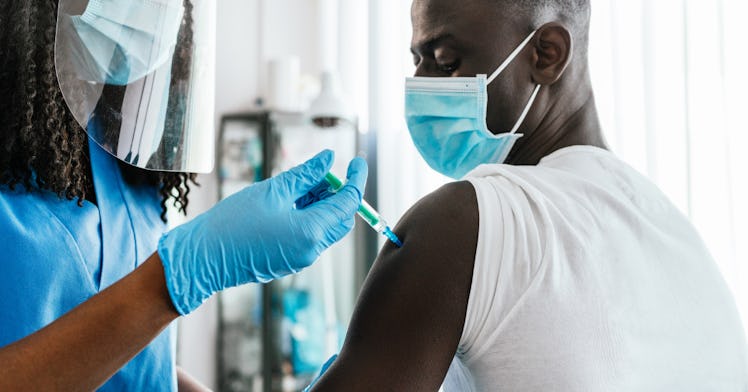COVID Booster May Protect You For Longer Than Thought, Report Suggests
New studies suggest the immune's response to the virus — when fully vaccinated — stays active for a while.

As we all come to terms with the very likely reality that COVID will be a part of our future even after the COVID-19 pandemic ends, we’re also looking into ways to can make life “normal” again. Much of this progress is thanks to vaccines, which have largely been successful at keeping fully vaccinated people from the most dangerous effects of the coronavirus. But as experts look into the possibility of a fourth vaccine dose, the second booster, new studies point to booster shots potentially being more protective long-term than was originally thought. Here’s what you need to know.
According to The New York Times, several recent studies have pointed to booster shots giving longer-lasting protection than was originally anticipated. “Three doses of a COVID vaccine — or even just two — are enough to protect most people from serious illness and death for a long time, the studies suggest,” reports The New York Times.
In October 2021, a third dose, called a booster, was added to the original two-dose schedule of the mRNA vaccines (the Moderna and Pfizer-BioNTech vaccines) with experts saying the boost would bring additional protection against COVID. This recommendation came when the Delta variant was spreading quickly across the country, and early studies suggested the two-dose schedule may not be strong enough to protect against the more serious effects of the virus.
Now, Delta has come and gone and the Omicron variant has slowed. As people look to the future, curiosity about a potential fourth dose being recommended has piqued interest. But these new studies show that the booster shot – which two-thirds of eligible adults in the U.S. have already received – is providing protection for long periods of time, and a fourth dose won’t necessarily be on the table soon.
“We’re starting to see now diminishing returns on the number of additional doses,” John Wherry, Ph.D., director of the Institute for Immunology at the University of Pennsylvania told The New York Times. Data shows that for the majority of people, any additional boosters past the first probably aren’t necessary at this time. The new studies are in line with statements from U.S. health officials that they’re unlikely to recommend a fourth dose anytime soon.
The experts did note that although a fourth vaccine won’t likely be necessary, it’s still recommended that people who are over the age of 65 or who have a high risk of illness due to immune deficiencies still receive three full-dose vaccines followed by a fourth dose as a booster to round out their protection.
Of course, experts aren’t ruling out the possibility of the general population needing another booster dose after many months or even years pass. But these studies bring welcome relief via the knowledge that those who have been vaccinated are generally well-protected right now.